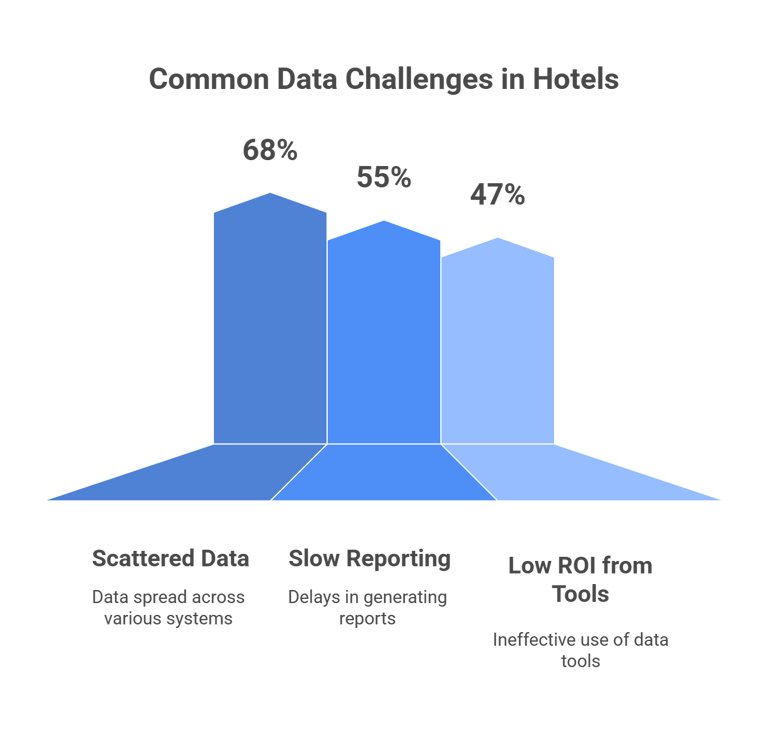
How Hotels Can Leverage Business Intelligence to Improve Operations and Guest Experience
Learn how hotels can leverage business intelligence and interactive analytics dashboards to streamline operations, optimize decisions, and elevate guest experience.
BUSINESS APPLICATIONS
Key Points
Business Intelligence (BI) helps hotels turn raw data into actionable insights, improving decision-making, operations, and guest experiences.
Hotels face challenges such as scattered data across departments, slow reporting, and low ROI from generic tools.
Custom dashboards provide department-specific insights, real-time reporting, and interactive visualizations to address these challenges.
Data consolidation and cloud-based access ensure a single source of truth and enable timely, informed decisions.
Best practices include walkthrough meetings, collaborative dashboard development, visually clear designs, and continuous updates.
BI benefits include operational efficiency, enhanced decision-making, revenue optimization, improved guest experiences, and fostering a data-driven culture.
Actionable takeaway: Start by identifying one key department or process where data is scattered, and implement a custom dashboard to centralize insights and improve decisions.
What Is Business Intelligence in the Hospitality Industry?
Business Intelligence (BI) refers to the use of data, analytics, and visualization tools to make better decisions and improve business outcomes. In the hospitality industry, BI allows hotels to track performance across departments, identify operational bottlenecks, and optimize guest experiences.
By turning raw data into actionable insights, hotels can understand trends in bookings, occupancy, revenue, and customer behavior. This enables teams to make informed decisions rather than relying on intuition or outdated reports.
With competition growing and customer expectations increasing, hotels that adopt data-driven decision-making gain a significant advantage. Business intelligence provides a foundation for smarter operations, improved service, and revenue optimization.
Common Challenges Hotels Face with Data
Despite the potential benefits, many hotels struggle to harness their data effectively. The most common challenges include:
Scattered Data Across Departments
Hotel operations often involve multiple systems. Front desk, housekeeping, finance, and marketing departments may each track their own data. This makes it difficult for management to get a complete picture of performance.
Slow Reporting and Decision Delays
Without centralized dashboards, teams spend time manually consolidating reports. Decisions are delayed because leaders lack timely information.
Low ROI from Generic Tools
Off-the-shelf reporting solutions may not align with hotel-specific KPIs. Teams often find themselves analyzing irrelevant metrics, reducing the value of the tools.
According to a report by Hapi & Revinate, 49% of hoteliers struggle to access critical data, and 40% cite disconnected systems as their biggest obstacle
How BI Dashboards Solve These Challenges
Department-Specific Insights
Custom dashboards tailored to each department ensure that teams track the metrics that matter most. For example:
Operations: Room occupancy, housekeeping efficiency, and maintenance requests
Finance: Revenue per available room, operational costs, and cash flow
Marketing: Campaign performance, booking sources, and customer engagement
Interactive dashboards allow team members to drill down into data for deeper insights. This ensures that every department has clear, actionable information at their fingertips.
Data Consolidation and Visualization
Designing proper data models is critical. By integrating data from multiple sources, including Excel, SharePoint, OneDrive, and hotel management systems, BI dashboards create a single source of truth.
Visualizations simplify complex data, making it easier for staff to understand trends, identify issues, and act quickly. A well-designed dashboard transforms raw numbers into intuitive charts, graphs, and indicators.
Real-Time Reporting and Access
Publishing dashboards on cloud platforms like Power BI Service allows teams to access information in real-time from any location. Whether a manager is on-site or working remotely, they can monitor performance and make informed decisions immediately.
Real-time data supports proactive problem solving. For example, if occupancy is lower than expected, marketing campaigns can be adjusted instantly to drive bookings.


Best Practices for Implementing BI in Hotels
Hotels looking to adopt BI should follow a structured approach to ensure successful implementation:
Conduct Walkthrough Meetings
Engage department heads and team members to identify critical KPIs and operational needs. This ensures dashboards address real challenges.
Collaborative Dashboard Development
Co-design dashboards with teams to make them intuitive and relevant. Iterative feedback improves adoption and usability.
Focus on Visual Design
Dashboards should be easy to read, visually appealing, and include drill-down capabilities for detailed analysis.
Continuous Updates
BI is not a one-time project. Dashboards should evolve with changing business needs and new data sources.
Benefits of BI for Hospitality Businesses
Implementing BI dashboards delivers measurable benefits for hotels:
Operational Efficiency Gains
Automated reporting and clear visuals reduce time spent on manual tasks and allow teams to focus on core responsibilities.
Enhanced Decision-Making
Managers can make faster, data-driven decisions to optimize occupancy, reduce costs, and improve guest satisfaction.
Fostering a Data-Driven Culture
When departments see clear metrics and results, they are more likely to adopt data-driven workflows. This cultural shift enhances collaboration and accountability.
Revenue Optimization
Insights into booking trends, pricing, and customer preferences allow hotels to adjust strategies and maximize revenue.
Guest Experience Improvement
Data helps identify service gaps, streamline operations, and tailor offerings to meet customer expectations.
According to Starfleet Research, 95% of hotel operators say BI helps reduce the time needed to gather information and make decisions.
How Exology Helps
Exology has helped numerous hospitality businesses across Egypt, the MENA region, and internationally successfully navigate their digital transformation journeys. Our experience ensures that hotels can overcome common challenges such as scattered data, slow reporting, and low ROI from outdated tools.
We provide custom BI dashboards that consolidate departmental data and deliver real-time insights for smarter decision-making.
Our AI and automation solutions streamline workflows and reporting, freeing teams to focus on guest experience and strategy.
Through BIaaS subscriptions, clients receive ongoing updates, maintenance, and dedicated support for their dashboards.
Our data analytics and visualization services turn complex data into actionable insights, helping hotels optimize operations and revenue.
We offer consulting and training to guide teams through adoption, ensuring a smooth transition to a data-driven culture.
Read More
Contact us
Whether you have a request, a query, or want to work with us, use the form below to get in touch with our team.




